The Lutheran Debate on Christian Nationalism - How Biermann v Ramirez Turned Out
On The Line Podcast hosted a debate on Christian nationalism, sponsored by Luther Classical College, between Rev. Dr. Joel Biermann and Rev. David Ramirez, the pastor of St. Paul’s Lutheran Church, Union Grove, Wisconsin. Ad Crucem News unpacks the debate below the fold, along with a full transcript.
No fireworks
Anyone expecting fiery exchanges and fierce disagreements with a clear victor and loser will be disappointed. In a nutshell, the discussion amounted to a lot of “I agree” statements.
Where Pastor Ramirez was less inhibited to act on, with, and through the body politic to recover Christendom for and in America, Professor Biermann was expressly risk-averse and even slightly fatalistic. He was prone to citing reasons to avoid any action at all, despite ultimately agreeing that Christians living in a state where Christianity predominates is salutary.
A theme that went undeveloped and unexplored was how the Christian church in America has shrivelled rather than thrived after being exposed to the relentless civic, economic, and cultural assault on it in the post-war era. Turning the other cheek has not winsomely won converts to grow the church.
This debate would never have taken place 80 years ago because it was taken for granted that America was hospitable to Christians and willing to advance and defend their interests.
The most pointed disagreement was when Dr. Biermann disapproved of lethal self-defense in the example of a congregation coming under violent attack during a service.1 Pr. Ramirez countered with the duty to defend the innocent and the defenseless.
Other disagreements of emphasis were evident with Pr. Ramirez pursuing a goal-oriented approach toward the defense and protection of Christians within a Christian civic and political context. Dr. Biermann was persistent in pressing a Christian witness orientation and repeatedly feared coercion and gauche expressions of “church and cross”. He also feared that a masculine Christianity could lead to racial, ethnic, and “jingoistic” expressions.
Key areas of agreement were:
Government as God’s Gift – Both affirmed that God ordains government and that it is necessary for order.
COVID – Both agreed Christians should not have suspended worship indefinitely. They differed in framing, but both criticized how the church handled government restrictions.
Dangers of Idolatry – Both warned against making an idol of nationalism, government, or political power.
Christian Engagement in All Estates – Both affirmed Christians have vocations in family, church, and government (though they differed on how to engage).
Critique of American Religious Liberty – Both suggested the U.S. model of “freedom of religion” is more Jeffersonian/Baptist than truly Lutheran.
Rev. David Ramirez (Partial to Christendom)
Core Thesis: Every Christian should desire a Christian community (family, town, state, or nation). This is a “necessary risk” despite pitfalls.
Definition: Christian Nationalism = God’s Word predominates not only in church and family, but also in society, culture, and law.
Vocation: Christians are called to seek God’s order in all three estates (family, church, government). To neglect this is to fail in vocation.
Risks acknowledged: Any good gift (family, marriage, etc.) can become an idol; so can political power. But that does not remove the Christian duty.
Contemporary Concern: The greater danger today is not youth embracing nationalism but forsaking the faith for worldly reasons (sexual ethics, secularism, evolution).
Historical Support: Luther and the Lutheran tradition tolerated blasphemy laws and opposed public false teaching to prevent God’s wrath and preserve harmony.
Goal: Cooperation between church and state, not confusion. Christians must actively work for laws and practices that align society with God’s Word.
Dr. Joel Biermann (Critical of Christian Nationalism)
Core Thesis: Government is a good gift of God, but post-Fall always imperfect. Christian Nationalism is often sincere but misguided.
Concerns:
Naivety about the extent of human sin and the brokenness of politics.
Misguided goals when conflating national identity with Christianity (e.g., wrapping the cross in the American flag, Fourth of July services).
Counterproductive witness: When Christians act as a political interest group, it undermines the Gospel. The church’s power is in witness, not coercion.
Imposition vs. Witness: The task of the church is to proclaim and live God’s truth, not enforce it by law. Imposing Christian morality risks alienating people.
Freedom critique: American emphasis on “religious liberty” is more Jeffersonian/Baptist than Lutheran. Still, prudence demands humility in how Christians pursue legislation.
COVID Example: Christians erred in over-obedience to government restrictions. Worship must never be abandoned indefinitely, even in emergencies.
Debate review
Ad Crucem News has published several articles dealing with Christian nationalism questions, including:
Has American Lutheranism Failed?
Lutherans love to extoll Martin Luther’s defiance against church and state, such as when he proclaimed, “Here I stand,” or burned the Papal bull. When the COVID-19 “pandemic response” rolled out, our Synod and congregations had the opportunity to live up to Luther’s Godly benchmark of courage and defiance. Instead, we saw 99% of the Synod fold, nonchala…
A Defense of Christian Culture in the Post-Pandemic Era
Recently, The Canadian Lutheran published an article by Rev. Dr. Thomas Korcok, which claimed that Christian Nationalism, as expressed in American and Canadian Christianity, is not compatible with Lutheran doctrine. Rev. Dr. Harold Ristau, president of Luther Classical College
Aphorisms on Christendom in the shadow of “Christian Nationalism”
Rev. Dr John Raymond Stephenson is an adjunct professor at Luther Classical College. He is a native of Hartlepool, England, holds a BA and MA from Oxford University (1974, 1982), a Diploma in Theology from Cambridge University (1975), and a PhD from Durham University (1983). He was ordained in 1985 and served Escarpment Lutheran Church, Lewiston, NY, be…
Church, Family, and State In Contemporary Canada
Editor’s note: Rev. Williams's paper is a response to the publication of A Lutheran Response to Contemporary Issues by the Lutheran Church Canada’s (LCC) Commission on Theology and Church Relations.
Theses on Christian Interaction with Civil Government and Society
This is the second set of theses prepared by Rev. Dr. Christian Preus and Rev. Jonathan Lange at the request of Wyoming District (LCMS) President, Rev. Dr. John Hill. The two documents were developed in response to “ongoing discussion among our pastors has been the matter of how our congregations, members, pastors, and the district as a whole relate to …
Desecrating Our Sacred Spaces
A two-week business trip to Australia with stops in Sydney and Perth allowed some time to survey church art and architecture in the Lucky Country. The takeaway is that Australia is suffering the same cultural barbarism that demoralizes Christians everywhere.
Is the Illegal Alien My Nearer Neighbor?
Our suburban Denver home needs exterior painting, and we’ve been calling contractors to source quotes. We could do it ourselves, but it’s probably not the wisest decision for half-centurions to be on ladders 40 feet off the ground at the highest points. So, we researched area companies and asked them to bid. All the painting outfits are just brokers—the…
Why is Our Country at War?
The title of this article alludes to Charles A. Lindbergh’s 1917 monograph, Why is Your Country at War? In it, Lindbergh, father of the namesake American aviation genius, argued that the US entered WWI due to the manipulations and greed of the “Money Trust,”
Finally, a Compassionate Trade and Industrial Policy Emerges
For too long, America's working class has been crushed under the weight of a ruthless trade and industrial regime orchestrated by a power elite—Wall Street Journal editorialists, think-tank technocrats, and globalist cheerleaders—who sold out the nation's heartland for the enrichment of a tiny financial caste
Importing Foreign Labor is Immoral
Incoming President Trump’s coalition has fractured, probably irreparably, after his billionaire tech bro alliance (the “PayPal Mafia”) went to war with the base over unlimited legal immigration. Up to and through the elections, there was complete alignment on ending illegal immigration and commencing mass deportations as soon as possible. Still, even th…
The Betrayal of American Manufacturing and Youth
There is a lot of despair and anxiety among youngsters entering the workforce, and they are justified in their apprehension. Their grandparents, who started work in the 1950s and 1960s, have no conception of their difficulties because they genuinely lived in a different world. Hopefully, we can help those grandparents understand the problem because they…
The Mirage of Victory: How Fukuyama's 'End of History' Led to Never Ending Conflict
In 1992, Francis Fukuyama published The End of History and the Last Man, a book-length treatment of his 1989 essay in the neocon foreign and security policy rag National Interest. Fukuyama triumphally declared that ‘Liberal Democracy’ was the terminal evolution of human social and political ideology;
Dr. Biermann drew criticism for his chapter on the Fifth Commandment in the controversial Luther’s Large Catechism with Annotations and Contemporary Applications for tightly circumscribing the traditional understanding of the right and necessity of self-defense, including the use of violence to the point of death. “Lethal force, Luther consistently taught, is rightly used only by the one placed into the Amt of authority in the state. It is never exercised for the sake of self, but always and only for the sake of the neighbor.”




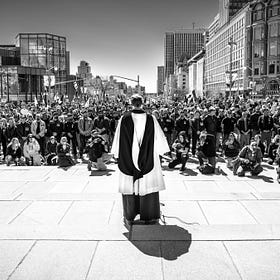

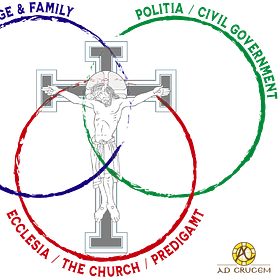
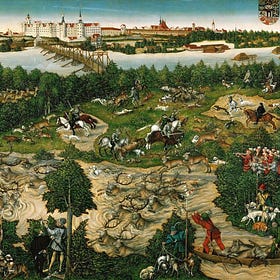
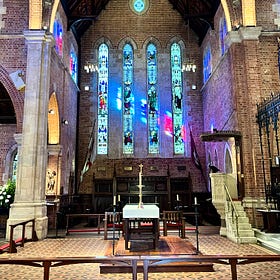

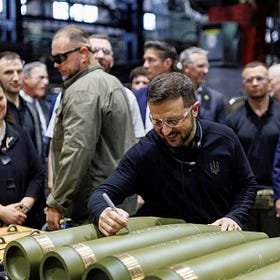

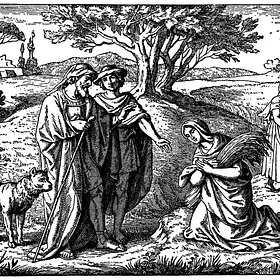

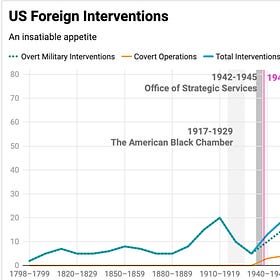

I think why it kind of ended up meandering is that, to paraphrase a Latvian saying, Two Doctors of theology three views of What CN is.
Personally I would say the definition of a CN establishment (and therefore aim) would be that "Christianity is the political formula of a political community." If one is familiar with the term of the Elite Theorists, though even they do not explore what it entails, being too modernist to concede to it anything but the status of a noble lie.
Nice recap, will help me when I give it a listen later. What does the second chart mean?